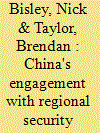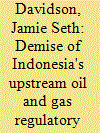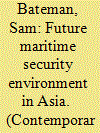|
|
|
Sort Order |
|
|
|
Items / Page
|
|
|
|
|
|
|
| Srl | Item |
| 1 |
ID:
137620


|
|
|
|
|
| Summary/Abstract |
Using a case study of Beijing’s participation in the Shangri-La Dialogue, a prominent annual security gathering in Singapore, this article analyses China’s approach to Asian security multilateralism. It does so by developing and employing a typology consisting of four characterizations of multilateral engagement: China as “blocker”; China as “socialized participant”; China as “shaper”; and China as “opportunistic participant”. The article shows that in its approach to the Shangri-La Dialogue, China displays all four of these traits, while noting that some are more prevalent and compelling at certain points in time. It uses this finding to draw conclusions about Beijing’s future engagement with the Shangri-La Dialogue and its broader approach to security multilateralism. It also contributes to the larger debate over whether China is a “revisionist” or a “status quo” rising power.
|
|
|
|
|
|
|
|
|
|
|
|
|
|
|
|
| 2 |
ID:
137627


|
|
|
|
|
| Summary/Abstract |
In late 2012, Indonesia’s Constitutional Court declared the law on oil and gas unconstitutional, ruling that the independent regulatory agency (IRA) interfered with the state’s direct control over the country’s resources as mandated in the Constitution. The controversial decision stunned the foreign investor community and Indonesia’s political establishment. To date, scholars have concentrated on the Court’s decision-making and have underscored the role that economic nationalism and political Islam played in opposing the Upstream Oil and Gas Regulatory Agency, which was viewed as a tool of foreign oil firms. This article presents an alternative perspective on the agency’s demise by deploying an institutional analysis of the IRA itself and its struggles to govern the country’s rich and hotly contested energy sector. It argues that while the vested interests that amassed against the agency were great, it was the country’s decline in oil production that sealed the IRA’s fate more than anything else.
|
|
|
|
|
|
|
|
|
|
|
|
|
|
|
|
| 3 |
ID:
137623


|
|
|
|
|
| Summary/Abstract |
This article adopts a risk assessment approach identifying the maritime threats and challenges that might confront Asia over the next decade. It addresses the evolving strategic environment, shifts in the maritime balance of power and the likelihood and impact of particular threats in the maritime domain. Issues considered include: the consequences of maritime sovereignty disputes; developments in regional naval forces; increased exploitation of marine resources, both living and non-living; and trends in illegal activity at sea. Three scenarios for the future maritime security environment are identified along with the possibility of “strategic shocks” that reflect inherent uncertainty in attempting predictions of the future. The paper concludes with possible measures to mitigate the risks of the threats
|
|
|
|
|
|
|
|
|
|
|
|
|
|
|
|
| 4 |
ID:
137618


|
|
|
|
|
| Summary/Abstract |
Indonesia’s new president, Joko Widodo, is new to foreign affairs and seemingly has little interest in diplomacy, a marked contrast with his predecessor Susilo Bambang Yudhoyono, who sought a role as an international statesman. Instead, Jokowi — as he prefers to be known — has declared that he will focus on domestic affairs as part of a broad reform programme, with a particular emphasis on strengthening Indonesia’s maritime infrastructure and reasserting the authority of the state. However, an activist presidency in these areas, even if intended only as a domestic effort, will create unintended foreign policy challenges for Indonesia because the country’s economic and maritime interests are so closely intertwined with those of its neighbours. This article examines Jokowi’s statements on foreign affairs, offers a survey of his foreign affairs advisers and places the president in the country’s historical and political context. It then examines potential flashpoints in Indonesia’s relationships with its neighbours over Jokowi’s agenda. It argues that under Jokowi, foreign policy is likely to become less clear, less conciliatory and less cooperative, with negative consequences for Indonesian leadership in the region.
|
|
|
|
|
|
|
|
|
|
|
|
|
|
|
|
| 5 |
ID:
137625


|
|
|
|
|
| Summary/Abstract |
This article critically analyses an intuitive and influential conceptual framework by which to understand state strategy in territorial conflicts. According to this framework, a state in a territorial dispute can pursue one of three general strategies: threaten or use force; offer territorial concessions; or delay. This article argues that it is problematic to regard these three candidate strategies as mutually exclusive. It is argued that not only can a strategy of escalation be compatible with one of delay, but many uses of force can be employed instrumentally in service of delaying. The framework, this article contends, does not so much capture “strategy” as it does certain aspects — or outcomes — of strategy, which while appropriate for certain analytical tasks is less so for others. The 2012 Scarborough Shoal incident is examined and China’s strategy during the event is scrutinized with a view towards assessing the strengths and weaknesses of applying the framework to an analysis of narrower scope. Lastly, it is argued that a framework for conceptualizing state strategy in territorial disputes should not be confined to three alternatives; it should be more broadly constructed, allowing for more nuance and taking seriously all the domains of statecraft.
|
|
|
|
|
|
|
|
|
|
|
|
|
|
|
|
|
|
|
|
|